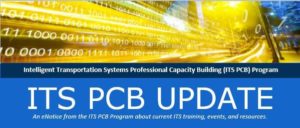 The ITS JPO invites you to join our 2020 Community College Virtual Workshop Series. The Workshop will be a multi-week collaborative event where educators and practitioners will define current and emerging entry-level ITS technician needs, discuss the relevant technical skills taught at community college programs, and evaluate the potential for bridging the current skills gap through community college partnerships. The workshop will feature presentations, panel sessions, and discussion with educators, professional associations, federal employees, and practitioners from state DOTs, MPOs, and private consultancies.
The ITS JPO invites you to join our 2020 Community College Virtual Workshop Series. The Workshop will be a multi-week collaborative event where educators and practitioners will define current and emerging entry-level ITS technician needs, discuss the relevant technical skills taught at community college programs, and evaluate the potential for bridging the current skills gap through community college partnerships. The workshop will feature presentations, panel sessions, and discussion with educators, professional associations, federal employees, and practitioners from state DOTs, MPOs, and private consultancies.
Please register on Eventbrite. We will email a webinar link in advance of each session to registered participants.
Workshop Schedule:
The dates of the following sessions are confirmed:
Session 1: Series Introduction and Transportation Agency Needs: Tuesday, June 30, 1:00-3:00pm EDT
Includes series intro from USDOT, overview of USDOT efforts in this area and how this workshop will be used to round out this effort (EPAWs), and discussion of existing and emerging needs from DOTs and transportation agencies.
Session 2: Community College Programs: Thursday, July 2, 1:00-2:30 pm EDT
Session 2 begins with a recap and summary of Session 1, followed by a panel session highlighting Community College educational programs that may align with the needs described in Session 1. An open discussion will follow, noting any additional learning objectives (and related teaching resources) that may be required to enhance a program such that graduates can immediately (and productively) join the ITS workforce. During open discussion, other CCs are encouraged to discuss other programs that align with transportation needs.
The dates of the following sessions are tentative:
Session 3: Community College and Transportation Collaborations: Wednesday, July 8, 1:00-2:30pm EDT
Some Transportation Agencies and Community Colleges have already benefitted from collaborations. Some have attempted to collaborate and/or to create a pipeline for hiring new staff. However, some of these partnerships have run into difficulties. Others have found ways to successfully recruit and build a transportation workforce using community college graduates. This session will include representatives from community colleges and industry discussing collaborations, collaborative potentials, and hurdles. During open discussion, other transportation agencies are encouraged to share how they’ve been able to successfully recruit from CCs as well.
Session 4: Welcome to Turner Fairbank (part 1 of 3): Wednesday, July 15, 1:00-2:30pm EDT
FHWA’s Research and Development headquarters, Turner Fairbank Highway Research Center (TFHRC), has been developing new technologies to advance the state of transportation, along with trainings and materials that could further advanced education of emerging topics in transportation. This session features tours and demonstrations from TFHRC, along with information for how folks can get involved in this cutting-edge research.
Session 5: Recap and Open Discussion: Wednesday, July 22, 1:00-2:30pm EDT
This session will feature a summary recap of everything learned to date, followed by an open panel discussion about the potential for strengthening the transportation workforce with community college graduates. Panelists will discuss the merits of engaging community college students and graduates, and will discuss how the USDOT, transportation agencies, industry, educators, and others, can and should get involved in the process.
Session 6: Turner Fairbank Workforce Development (part 2 of 3): Wednesday, July 29, 1:00-2:30pm EDT
A continuation of Session 4.
Session 7: Turner Fairbank Workforce Development (part 3 of 3): Wednesday, August 5, 1:00-2:30pm EDT
A continuation of Sessions 4 and 6.
Session 8: Wrap-up and next steps: Wednesday, August 12, 1:00-3:00pm EDT
USDOT will summarize all main points discussed. A brief (~30 minute) period will be set aside for open discussion from all participants. Following that, USDOT will discuss clear action items in GOST format, and will invite (… and encourage!) all participants to engage in one of the task implementation/action item teams.